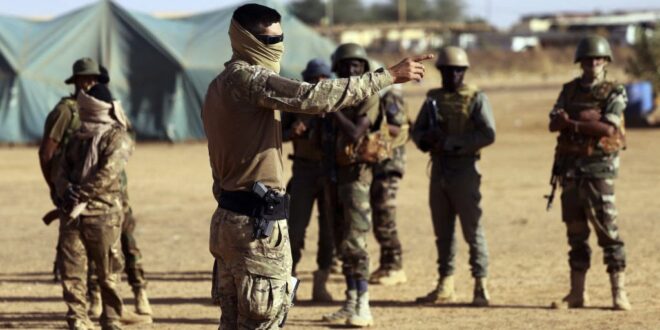Sahel states such as Mali do not possess the essential services to deliver to their impoverished and ethnically divided constituents. These economic and social shortcomings render national governments vulnerable to the challenge posed by sub-state jihadist groups affiliated with the Islamic State and Al Qaeda.
The decline in security not only permitted both terrorist groups to expand their area of operations in the Sahel but also to Atlantic coastal states of West Africa such as Benin.
Moscow also seized upon this security vacuum as an opportunity to dispatch Russia’s Wagner Group mercenaries to Mali, where the military junta apparently hopes to use the Wagner to coup-proof the regime.
When France closed down its ten year anti-terrorist deployment to the Sahel, it enabled JNIM to extend its deadly reach to the border regions of Cote d’Ivoire (Ivory Coast) and Niger, and even as far as Togo.
One thing is certain: since the arrival of the Wagner Group, reports of civilian atrocities have increased and the overall security status of Mali has dramatically worsened.
The Islamic Jihadist challenge to the legitimacy and sovereignty of post-colonial nation-states throughout the entire expanse of the African continent’s Sahel region is seriously worsening.
To begin with, the internecine warfare between jihadist groups in the West African states of the Sahel, just south of the Sahara Desert, has become an existential threat to the legitimacy of the region’s national governments.
Warring Sahel-based Islamist terrorist groups are competing with nation-state administrations as potent alternative models for governance. Sahel states such as Mali do not possess the essential services to deliver to their impoverished and ethnically divided constituents. These economic and social shortcomings render national governments vulnerable to the challenge posed by sub-state jihadist groups affiliated with the Islamic State and Al Qaeda. The departure of France’s troops from Mali in April, followed by the June 2022 shutdown of the French-led multilateral European Special Forces “Task Force Takuba,” created a security vacuum in the region.
After the withdrawal of European forces, the consequent reduction in regional security was immediately exploited by pro-Al Qaeda and Islamic State affiliates. The decline in security not only permitted both terrorist groups to expand their area of operations in the Sahel but also to Atlantic coastal states of West Africa such as Benin.
Moscow also seized upon this security vacuum as an opportunity to dispatch Russia’s Wagner Group mercenaries to Mali, where the military junta apparently hopes to use the Wagner to coup-proof the regime, while Russia apparently hopes to mine valuable minerals in the country.
Al-Qaeda’s West African affiliate “Ja’maat Nasr Al-Islam wal Muslimin” (JNIM), a coalition of several minor jihadist groups in the Sahel, established in 2017 , however, seems to be becoming a lethal threat to Mali’s central government. JNIM, although it is the dominant force in rural Mali, is also strong in rural Burkina Faso. JNIM receives some financial support from Al-Qaeda in the Islamic Maghreb (AQIM) headquartered in Algeria. JNIM reportedly raises additional funds from its role in the region’s illicit economy, particularly in Burkina Faso, through vehicle theft, logging and kidnapping When France closed down its ten year anti-terrorist deployment to the Sahel, it enabled JNIM to extend its deadly reach to the border regions of Cote d’Ivoire (Ivory Coast) and Niger, and even as far as Togo.
The Islamic State’s regional affiliate, the Islamic State in the Greater Sahara (ISGS), has been renamed the Islamic State in the Sahel. The group has maintained its independence of action by continuing to challenge JNIM in the Sahel along with conducting attacks against national government interests. ISGS also has expanded its area of operations following France’s troop withdrawal from Mali as the terrorist outfit has spread out all along the tri-border region of Mali, Burkina Faso and Niger. The Islamic State’s ideological profile in the Sahel is that of a strict Sunni Salafi-Jihadist sect but it is also infamous for its atrocities against civilians. ISGS is committed to the enforcement of “Hudud” (Islamic criminal law): punishments for personal behavior — such as theft, blasphemy, apostasy, adultery and homosexuality, among other transgressions — forbidden by the Koran.
According to the United States Military Academy’s “Combating Terrorism Center,” pitched battles between the Al-Qaeda and Islamic State in Africa have been most intense along the Mali-Burkina Faso border. After the withdrawal of French troops, Mali’s military junta, installed by a coup in May 2021, welcomed Russia’s offer of counter-terrorist assistance.
Russia’s Wagner Group began deploying to Mali in December 2021. The Wagner Group’s game plan for Mali, as in its past involvement in the Central African Republic, will probably consist of the Malian junta’s granting Wagner rights to the country’s diamond deposits. It is not certain, however, if the Malian regime has sovereign control of these diamond mines: those areas are infested with criminal and sub-state militia forces.
One thing is certain: since the arrival of the Wagner Group, reports of civilian atrocities have increased and the overall security status of Mali has dramatically worsened. The atrocities appear mostly in areas of Mali where support for the country’s Jihadist terrorists is strong, as in the southern-central village of Moura, controlled by Islamic extremists. Consequently, the women and children slaughtered are deemed by Mali’s regime and its Wagner Group allies as families of the Jihadists, particularly among the largely Peuhl ethnic group, many of whom have been recruited by Islamic terrorists.
There is also evidence that Mali’s Islamic militias linked to both Al-Qaeda and the Islamic State have murdered scores of civilians. Despite the negative impact on security that Wagner Group mercenaries have had in Mali, there are reports that the Russia mercenary militia organization are currently in talks with neighboring Burkina Faso where Jihadist operations continue to spread.
 Eurasia Press & News
Eurasia Press & News




